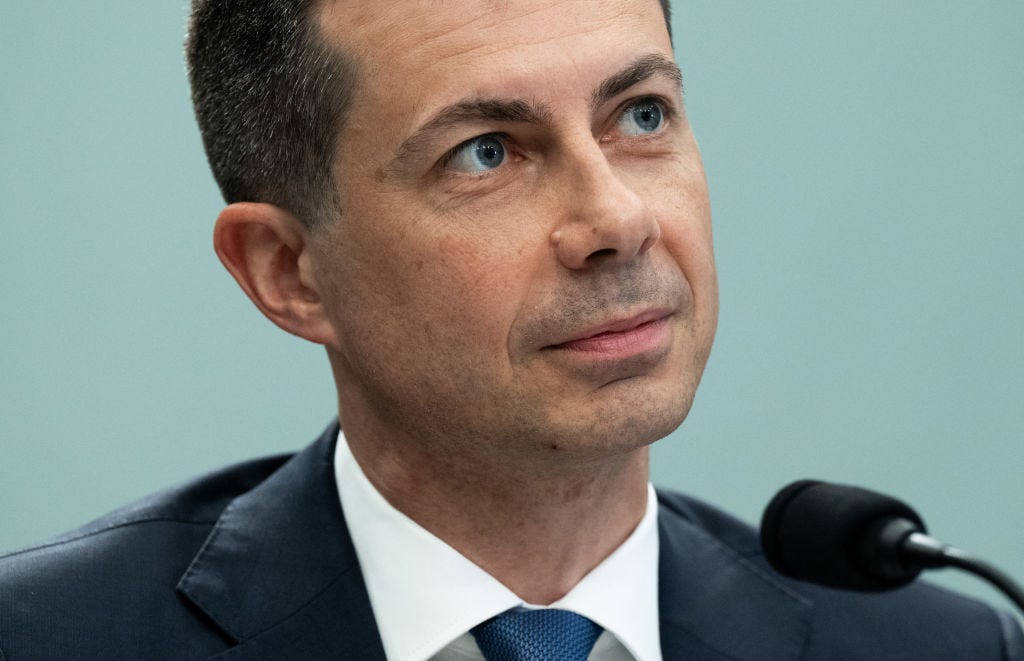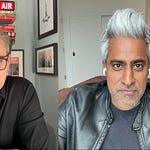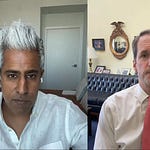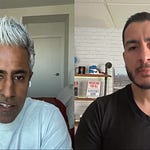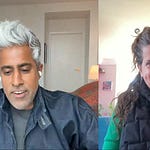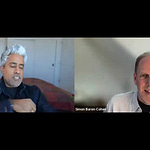Last week, we spoke with Secretary of Transportation Pete Buttigieg, the cabinet secretary and former presidential candidate who has been one of the most effective communicators in the Democratic Party, and has brought his breadth of experience to the job of fixing America’s infrastructure, a project the Biden administration has been committed to on a scale not seen since the New Deal era.
Buttigieg has distinguished himself as not only a political figure but also a serious thinker on a huge range of issues. He also has rare skills in conveying ideas — especially across the great American partisan divide. Nobody can sell a bridge — and we mean that in the best possible way — quite like Secretary Pete.
We talked to Buttigieg about his notion of infrastructure as a defense against extremism and authoritarianism: “Toxic politics arise in conditions of policy failure, in conditions of shared stress, and in conditions of inequality. And we're addressing all of those,” he said.
We also got into why he goes on Fox News as well as the changing nature of fatherhood and what it means to be a man.
We hope you appreciate the following excerpt, and we encourage you to subscribe and read the full conversation (click on the link below).
(Note: Secretary Buttigieg spoke with The Ink in his official capacity and could not comment directly on the 2024 presidential campaign.)
Each week, we excerpt a piece from our archives for our free subscribers to enjoy. If you appreciate these posts and the labor that goes into them, we’d be honored if you’d join us as a paid subscriber.
A request for those who haven’t yet joined us: The interviews and essays that we share here take research and editing and much more. We work hard, and we are eager to bring on more writers, more voices. But we need your help to keep this going. Join us today as a paid subscriber to support the kind of independent media you want to exist.
I think the president seems to have a kind of metric of success that is really in the built, physical environment, whether it's industrial policy and what is made here versus somewhere else, what infrastructure we have versus don't have. And I'm curious about the notion of selling people on those kinds of accomplishments and having the political opposition not offer a different vision of accomplishments, but really stuff that’s much more in the emotional and psychological realm, fear and hatred of others.
What is it like to say Hey, I got a bridge," and be up against someone saying, "Those people are endangering your child”? Is it not difficult to sell worthy things like a bridge when the opposition is playing so effectively on that really deep human stuff? And how do you think about selling against that opposition?
It's a real challenge for us because you know the nature of infrastructure is actually, like most things, you just kind of need to work. The only time you usually get emotional about it is when it doesn't work, right? So I'm kind of the exception. I'll be very emotional about a bridge being built perfectly well and doing exactly what it should without incident, right? But that's because I work on it professionally and I'm in a building full of people who work on it professionally. But for the most part, the nature of good infrastructure is you don't have to think about it.
I actually think some of the rewards — and even in kind of a political sense of it — they don't accrue because people consciously say, "Oh, you did this good infrastructure thing. I'm going to give you credit for it." It happens in a more indirect, but I would argue, actually, more foundational way, which is the more you do that, over time, the more you wind up having a level of stability and trust where all of the kind of negativity and the kind of anger-rousing that plays on social mistrust is less likely to find purchase.
Now, I know that's a very long-term thing to talk about in a kind of 24/7 news cycle kind of world. But I do think that's part of what's at stake in what we're doing. The challenge, of course, is it takes a long time for that to mature.
You're saying that — if I get it right — that essentially making people's lives less stressful, less full of anxiety because they have easier commutes, because their car doesn't get damaged, because of things they may not have been aware are happening, but are happening, reducing the collective stress and anxiety, increasing the mental health and well-being of the country at large through infrastructure and other things, makes toxic politics less salable?
Yes, I think so. Absolutely. I think toxic politics arise in conditions of policy failure, in conditions of shared stress, and in conditions of inequality. And we're addressing all of those. Nothing's more stressful than a commute that goes poorly. We're working on that. But also, the inequality thing is very real. I think it's perverse how some of the people whose agendas are to make inequality worse have benefited from the kind of psychological stresses in the public psyche that I think are attributable to inequality. But that's where we're at. That's how this happens sometimes. And probably an undersold story of what we're doing with transportation is using it to bring access to people whose lack of access helps diminish social mobility.
Does this theory of change work on a timescale where the opposition that you are often testifying in front of in Congress or dealing with in other ways is right now and quite effectively — with very powerful tools like Fox News and Steve Bannon's podcast and whatever else — inflaming people in an immediate way.
So it's like a leaky roof. The best time to do it was yesterday. The next best time to do it is today. So yeah, I don't think the kind of political economy of infrastructure development is going to single-handedly save us from this kind of toxicity. I do think we've got to be doing it, and we've got to be doing it now. And you know in the shorter term, there are ways to make sure that it gets some level of attention and that the people who make good choices get some amount of credit.
You are someone who comes from a state that's a red state, and your dad, I think, was a translator. You speak multiple languages. You've been a very good translator across the red and blue divide for a lot of people, explaining different sides of America to each other. And I want to ask you a very basic thing which troubles me in this moment, when we talk about toxic politics, that kind of lizard brain politics. You come from a place, a community with lots of decent people. And I think generally — I assume most people are decent people.
And yet we're in a moment in which a very, very, very large number of our fellow citizens — forget the elites on top — just very, very large numbers of soccer coaches and moms and dads and deacons and community leaders of all kinds, are attracted to authoritarianism, are attracted to a politics of hatred, are attracted to, you know as you deal with all the time, just like outright lies as a kind of structure of belief.
So at a very basic level, what do you think has happened to very, very large numbers of our fellow citizens that they have fallen in the thrall of these kinds of ideas and tendencies?
So my view of human nature has always been that the world isn't made up of a lot of good people and a lot of bad people, that we're all roughly equally susceptible to good and bad influences and doing good and bad things and making good and bad choices.
And what really matters most about leadership in my view, what really matters most about politics is that it can either call to what is best in us, what is most generous and forward-looking and decent and brave. Or it can call out what is worst in us, what is most backward-looking and zero-sum and harmful. And any of us, I think, is actually vulnerable based on our situation and our information diet and a whole bunch of other things to getting pulled in either direction.
Why is it so hard for Democrats to explain things in a certain language? I'm not asking you to put down anybody else, but can you talk a little bit about your philosophy of communication? You do seem to come at it just differently from lots of people in your world. You come from a different background in multiple ways than maybe lots of your colleagues. Again, not putting anybody else down, but what is your philosophy of communication when it comes to reaching other people, tapping into other people's moral frames, being able to be kind of hearable to people while also insisting on your truths? Tell me a little bit about your philosophy of communication.
I was raised with more progressive values in a very conservative place. I was very different from a lot of the people around me. And I think when you're around when you stick out, when you're different, there's different ways you can approach that. One is to just conform. I couldn't do that. I couldn't just conform to values or styles that weren't me. Another is to kind of do the opposite, to just kind of rage against all the things that you don't align with.
But another is to figure out how you can engage people. Often, I think about, honestly, sometimes I even think about this with media folks on the right that I might be in an appearance with, like a somewhat hostile interviewer. And I just think about the guy at the end of the bar in South Bend, Indiana who I don't just know but like, who also has political views that I find horrifying. How would I talk to him? How did I talk to him? I mean, this is not a hypothetical. And it's different if you imagine liking and caring for the people you're talking to. It doesn't mean you're always going to get through to them, but it begins to give you the terms to meet people where they are without pretending to be like them more than you are.
And it turns out people also respect that. We all know from a mile away when someone is insincerely trying to clothe themselves in our values or our style in order to appeal to us, right? And young people in particular have a nose for that, but we all do. Sometimes you get more respect from somebody who you still haven't won over in terms of convincing them that they were wrong and you're right, but maybe moved them an inch because they saw why you believe what you believe. And if you just explain what you believe in terms that make sense to you and could make sense to them, they can see it. They can feel it. I think there's something really powerful in that.
More specifically, why do you believe in going on Fox News? And why do you think it's a good use of your time? Do you get feedback that makes you think that it is going somewhere in people's heads, even though it is a lion's den?
I'm under no illusion that a Fox News host is ever going to say, "You know what, Secretary, now that you've explained it, I see the error of my ways and you were right all along." It's not like that. But I think, first of all, you know there's a lot of folks who tune in in good faith and may literally never hear our message crisply put unless somebody like me gets on there and delivers it.
I also think that you know for every person who chose to turn the news to that channel, there's a family member or two or three, maybe a spouse, maybe kids who didn't make that choice, but they're consuming that media as well. Also, the fact you know the way that everything we do and say on television now circulates online 10 times more than what anybody saw while it was being broadcast.
And you know when I said back when I was running for president that you can't love your country and hate half the people in it, you know that was something I felt about the other side. But it wasn't only something I was saying as a message to the other side.
Can you talk about choosing to be a parent in a moment of so many crises, when we are talking about, "Could this be the last free and fair election? Is the planet going to be habitable in half a century?" Talk about the act of optimism of choosing to be a parent in such a world.
So you know as ferocious and perhaps deadly as these challenges are, I just don't think that they justify that kind of pessimism. Partly because of history. I mean, you know our climate has seen times when people died by their thousands in the toxic smoke of a London fog. And we found ways to make that better. Our democracy has seen times in which one-half of this country broke off and fought a war against the other half in order to be able to keep enslaving people. And we got out of that, maybe not perfect, but better.
And I just don't think given that we got through all of that, I don't think that pessimism is justified. But more than that, I don't think it's permissible in a way. And what I mean by that is that there's a kind of obligation that is laid at our feet. Anybody who is in a position of responsibility, whether it's the enormous privileged responsibility of having a high federal office or just the responsibility of being a citizen to build on what came before.
And so when I think about the fact that, for example, something as basic as a family like mine existing, right? Couldn't have happened 10 years ago, at least not in the state I grew up in. And it was unthinkable 50 years ago. And people marched and sometimes got their heads bashed in over that, and they won to say nothing of any of the other struggles for equality, injustice, or just improvement in the life of our country, who are we to say, "This is where the video game ends, and it's all going to get worse from here?" That is such a disservice to all of the people who did so much to make things now, even on these metrics we think about, like the quality of the environment, radically better than at other times in the life of our country or our world that they were.
Who are we to be the ones who say, "You know, this isn't going to work out.” How could we?
So that's what propels me as a parent and definitely as a policymaker.
Your support makes The Ink possible. We’d be honored if you’d become a paid subscriber. When you do, you’ll get access each week to our regular posts and our interviews with the most thoughtful people out there — and you’ll be able to join the conversation in our comments section.





